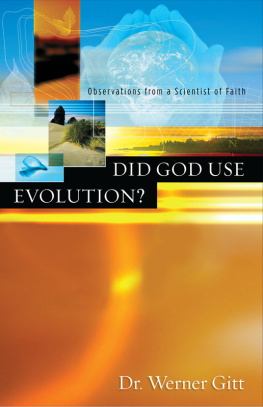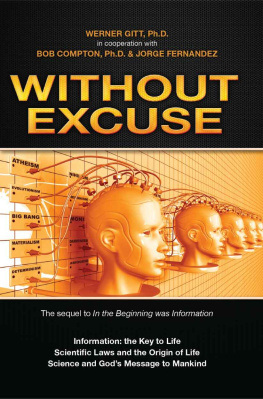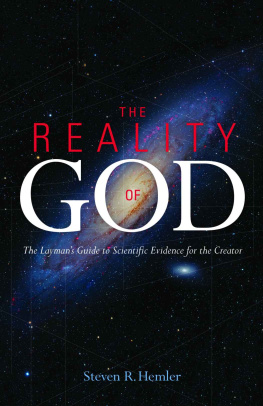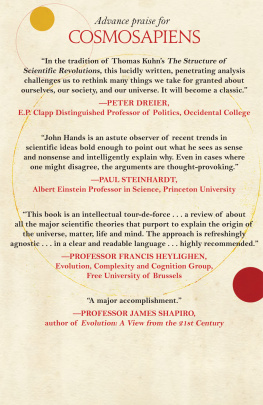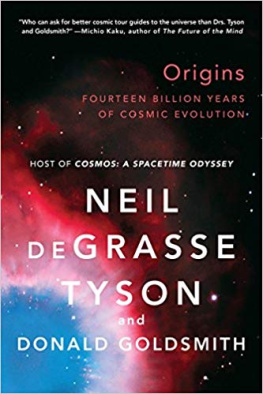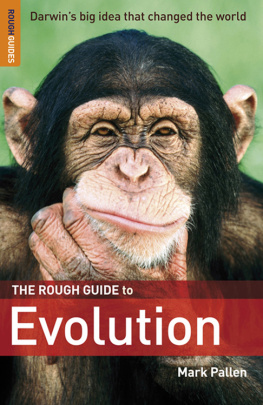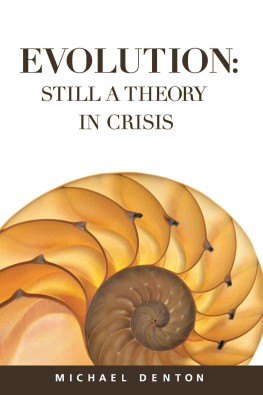Did God Use Evolution
Observations from a Scientist of Faith
Dr. Werner Gitt
Copyright Information
First printing: August 2006
Copyright 1993, 2006 by Werner Gitt. All rights reserved. No part of this book may be used or reproduced in any manner whatsoever without written permission of the publisher except in the case of brief quotations in articles and reviews. For information write: Master Books, P.O. Box 726, Green Forest, AR 72638.
ISBN-13: 978-0-89051-483-2
ISBN-10: 0-89051-483-6
Library of Congress Number: 2006931166
Cover by Left Coast Design, Portland, Oregon
Unless otherwise noted, all Scripture is from the New International Version of the Bible.
Printed in the United States of America
Please visit our website for other great titles:
www.masterbooks.net.
For information regarding author interviews, please contact the publicity department at (870) 438-5288.
Acknowledgments
The original manuscript was scrutinized by Professor Dr. Horst W. Beck, Dr. Reinhard Junker, and Dr. Jan Kaminski. I am very grateful for all their suggestions and additions.
I am grateful to Professor Jaap Kies, who was able to devote his valuable time to the translation of this book. A special note of appreciation is due to Marianne Rothe, who edited the translation.
Contents
Introduction
The theory of evolution is currently so widely established that it could be described as the all-inclusive and even the only philosophy of the 20th century.
The idea of self-organization from the simple to the more complex has been commonly appropriated even in disciplines foreign to biological evolution. The development of computers is often falsely referred to as the "evolution of computers," even though the current high-performance computers are the result of intensive research by many brilliant minds. They have been planned, constructed, and produced on purpose, and are clearly not the result of an evolutionary process.
Theology, too, was affected; evolutionary ideas have even been carried into biblical exegesis.
We will show below why evolutionistic thought is completely foreign to the Bible. This book is aimed predominantly at Christian readers who might be inclined to accept some version of theistic evolution. Over and above that, the book is set out in such a way that skeptical readers may also be guided to some decision.
The basic assumptions of science are discussed in a separate chapter. This should enable the reader to recognize which basic assumptions he automatically accepts when he decides for or against creation or evolution.
Use of the term "the theory of evolution" is intentionally avoided, because, according to the standards of science theory, evolution is a philosophical doctrine, and not a scientific theory. For the same reason, we do not refer to creation theory, but to the biblical doctrine of creation. Creation research concerns itself with deducing models from physical reality, which are based on fundamental biblical statements. A total of 20 objections (OB1 to OB20) against theistic evolution is discussed in this book. In addition to valid criticisms of evolution, the alternative, creation, is increasingly expounded more clearly in recent literature, such as [B4, E2, G3, G5, G7, G8, G10, G11, J2, S3, S4, S5]. This book also refers repeatedly to this very sustainable alternative.
As far as possible, the objections are discussed along the following lines:
- The dictates of evolution
- Scientific objections against these dictums
- Biblical refutations of evolutionary assumptions
The author is an information scientist, but the discussions on information concepts in chapter 6 should be readily understood by the layman. In the last chapter, scientific and biblical objections against evolution culminate in the exposition of ten dangers inherent in theistic evolution. Many quotations expose the anti-biblical nature of such a viewpoint.
Chapter 1
Scientific Questions
1.1 The Principles of Science Theory
Science theory concerns itself with the possibilities and the limits of scientific knowledge. The basic assumptions of a theory are discussed, applicable methods for increasing mans knowledge are explained, and, eventually, the validity of scientific pronouncements is reviewed and evaluated. Some basic principles (P1P11) are enunciated below:
P1:Every theory requires basic assumptions (a priori postulates) which cannot be proved. These presuppositions are not observable, but are of a metaphysical nature (Greek: met t physik = above physics, i.e., not based on observation). Such assumptions are recognized by convention. As W. Stegmller [S7, p. 33] affirms: "One need not push knowledge aside to make place for belief. Rather, one must already believe something before you can speak of knowledge and science."
P2:The basic assumptions are arbitrary postulates which appear plausible to the author. According to the theoreticist Karl R. Popper, the fundamental principles of a theoretical system may be compared to the conclusions reached by a jury in a criminal case. The verdict is the basis for the practical processes which comprise the joint deductions made from the statutes of criminal law. The verdict, however, need not be the final judgment; it can be repealed or revised by an appropriate process.
Popper explains [P5, p. 110111], "The analogy between this procedure and that by which we decide basic statements is clear. It throws light, for example, upon their relativity, and the way in which they depend upon questions raised by the theory. In the case of the trial by jury, it would be clearly impossible to apply the theory unless there is first a verdict arrived at by decision; yet the verdict has to be found in a procedure that conforms to, and thus applies, part of the general legal code. The case is analogous to that of basic statements. Their acceptance is part of the application of a theoretical system; and it is only this application which makes any further applications of the theoretical system possible. The empirical basis of objective science has thus nothing absolute about it. Science does not rest upon rock. The bold structure of its theories rises, as it were, above a swamp. It is like a building erected on piles. The piles are driven down from above into the swamp, but not down to any natural or given base; and when we cease our attempts to drive our piles into a deeper layer, it is not because we have reached firm ground. We simply stop when we are satisfied that they are firm enough to carry the structure, at least for the time being."
P3:The initial postulates must be mutually consistent and should be free from inherent contradictions.
P4:When competing theories contradict one another (apart from errors in measurement and observations), the fault is not to be sought in the facts, but in differences in the basic postulates.
P5:The basic postulates may be objectively criticized and even rejected. The quality of the basic assumptions of two competing systems determines the practical success of the ensuing theories.
P6:If a theory is successful, it does not follow that it is correct. "Consequently, theories are never empirically verifiable" (K. Popper; [P5, p. 17]). According to Popper, consistency is not a truth criterion, but, on the other hand, inconsistency does falsify a theory. No all-inclusive theorem, like "All swans are white" can ever be verified, not even by endless experimentation. Theories can only survive, and are only provisionally valid, for as long as they are not shown to be false by empirical reality (when a single black swan is found), and subsequently replaced by a new, better theory.

